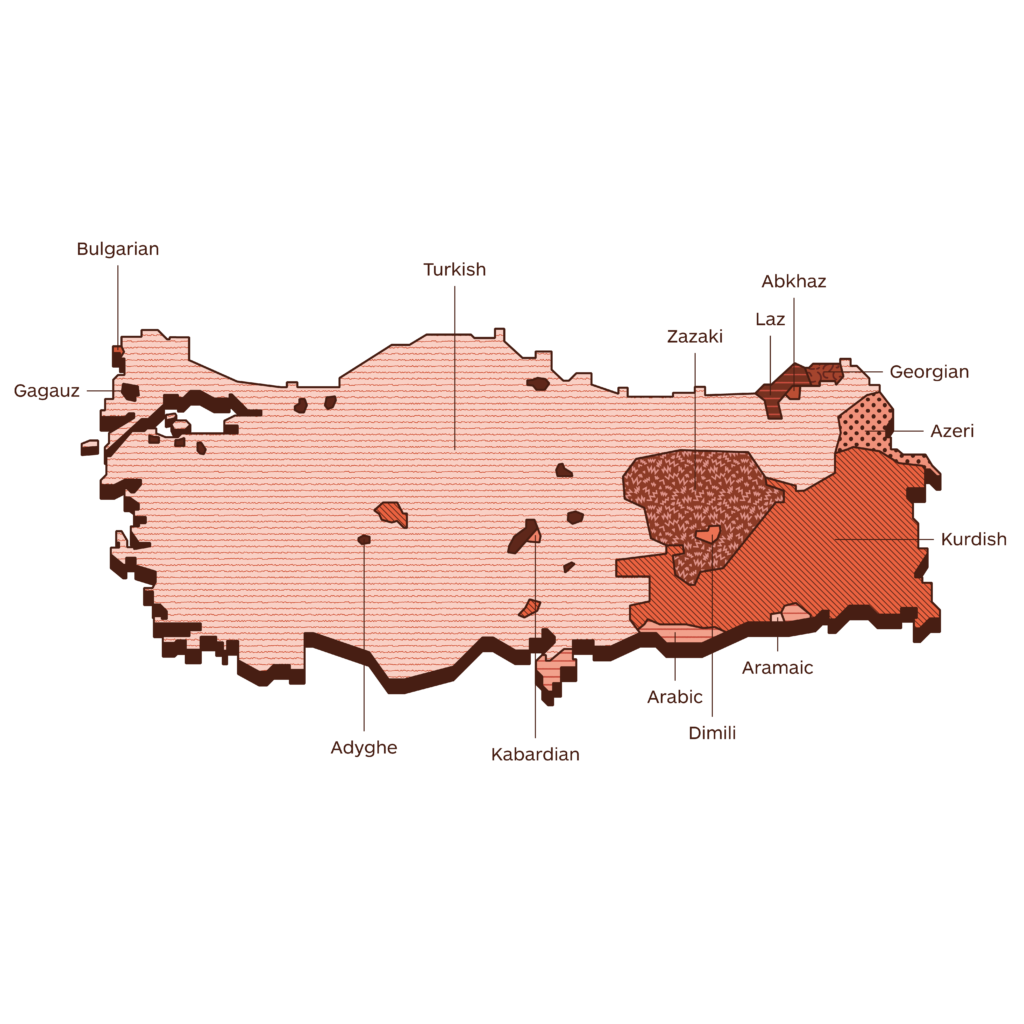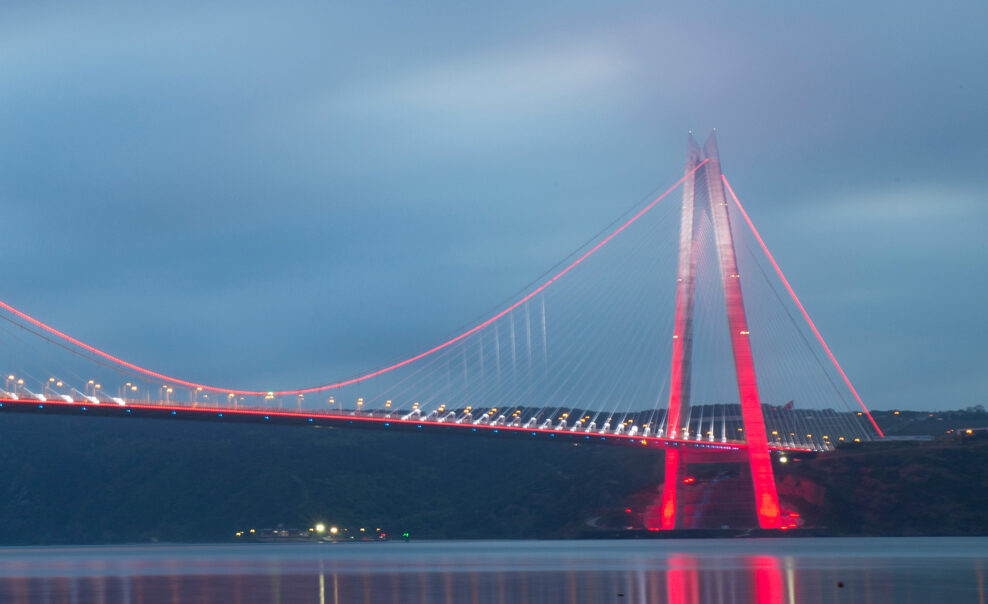Asia
To which language should you translate to localize in Turkey?
What we know from our community
“Turkish is the official language of the Republic of Turkey. Some 70 other languages and dialects are also spoken, including various dialects of Caucasian and Kurdish as well as Arabic, Greek, Ladino and Armenian, and Balkan languages like Bosnian, Albanian, Bulgarian, the almost extinct Syriac. Of the 4,000 or so languages currently spoken in the world, Turkish ranks seventh in terms of numbers of speakers and area, being used by around 200 million people.
Outside of Turkey, the Turkish diaspora and minorities in the former Ottoman lands (about 30 countries) speak Turkish. Closely related languages fall under the umbrella of Turkic languages and for Turkey, “Istanbul Turkish” is the modern, accepted norm. The language is phonetic, agglutinative, and grammatically genderless, uses some special letters and follows a vowel harmony.
A map of Turkey would quickly reveal that geographically it is a bridge between the west and the east, which makes her also a hub for trade and business. One thing to keep in mind when localizing in Turkey would obviously be to be aware of the cultural nuances and sensitivities. Not labeling the country and/or the culture simply as Middle Eastern or Arabic would go a long way as well as avoiding religious undertones. We take pride in living on a beautiful land that has been a cradle of civilizations for many centuries, speaking a language that dates back even more centuries and we are a very diverse bunch.”
LANGUAGE INSIGHT
Official language
Turkish (87.6%; 74.75 mln)
Actual languages
Turkish (87.6%; 74.75 mln), Kurdish (10.4%; 8.87 mln), Arabic (1.4%; 1.19 mln), other (0.6%; 511k)
What the top 150 best localized websites in the world do in Turkey
(Top 150 websites listed in the Global by Design ranking – published annually by Byte Level Research, this report provides a list of globally localized websites, showcasing best practices and emerging trends in their globalization)
- 103/150 localize by translating into Turkish
- 1/150 localizes by translating into Turkish, Turkish cyrillic, Turkish meskhetian and Turkish sign language
- 1/150 localizes by translating into Turkish, French and Simplified Chinese
- 1/150 localizes by translating into Turkish, French, Spanish, German, Italian, Portuguese, Russian, Simplified Chinese, Traditional Chinese, Korean, Japanese, Bahasa Indonesia, Hungarian, Polish, Romanian, Thai and Ukrainian
- 1/150 localizes by translating into French, German and Russian
- 1/150 localizes by translating into French, Spanish, German, Italian and Simplified Chinese
- 1/150 localizes by translating into French, Spanish, German, Italian, Portuguese, Russian, Simplified Chinese, Traditional Chinese, Korean and Japanese
-
3M
-
ABB
-
Accenture
-
Adidas
-
Adobe
-
Airbnb
-
Aldi
-
Amazon
-
American Airlines
-
American Express
-
Apple
-
Audi
-
Autodesk
-
Avis
-
Bayer
-
BMW
-
Booking.com
-
Bosch
-
British Airways
-
Bumble
-
Burberry
-
BYD
-
Canon
-
Capgemini
-
Cartier
-
Caterpillar
-
Chevrolet
-
Cisco Systems
-
Citibank
-
Coca-Cola
-
Costco
-
Dell
-
Deloitte
-
Delta
-
DHL
-
Disney+
-
Dyson
-
eBay
-
Eli Lilly
-
Emirates
-
Ernst & Young
-
Facebook
-
FedEx
-
Ford
-
Four Seasons
-
Fujifilm
-
GE
-
Gillette
-
GoDaddy
-
Google
-
Gucci
-
Haier
-
Heineken
-
Hermès
-
Hertz
-
Hilton
-
Hisense
-
Hitachi
-
Honda
-
Hotels.com
-
HP
-
HP Enterprise
-
HSBC
-
Huawei
-
Hyatt
-
Hyundai
-
IBM
-
IKEA
-
Intel
-
InterContinental Hotels
-
J&J
-
Jack Daniel's
-
Jehovah’s Witnesses
-
John Deere
-
Kellogg's
-
Kia
-
KPMG
-
L'Oréal
-
Land Rover
-
LEGO
-
Lenovo
-
Lexus
-
LG
-
Louis Vuitton
-
Lululemon
-
LUSH
-
Marriott
-
MasterCard
-
McDonald's
-
Mercedes-Benz
-
Merck
-
Microsoft
-
Mitsubishi Electric
-
Nestlé
-
Netflix
-
Nike
-
Nikon
-
Nintendo
-
Nio
-
Nissan
-
NIVEA
-
Oracle
-
Pampers
-
Panasonic
-
PayPal
-
Pepsi
-
Pfizer
-
Philips
-
Pitney Bowes
-
Porsche
-
Procter & Gamble
-
PWC
-
Revolut
-
Rolex
-
Royal Caribbean
-
Salesforce
-
Samsung
-
Sanofi
-
SAP
-
Sephora
-
Shopify
-
Siemens
-
Sony
-
Spotify
-
Starbucks
-
Steelcase
-
Stripe
-
Subaru
-
Tesla
-
The Church of Jesus Christ of Latter-day Saints
-
Tiffany
-
Tinder
-
Toshiba
-
Toyota
-
TripAdvisor
-
Uber
-
United Airlines
-
UPS
-
Visa
-
Volkswagen
-
Volvo Cars
-
Vrbo
-
Walmart
-
Western Union
-
Wikipedia
-
Wise
-
WordPress
-
Workday
-
Xerox
-
Xiaomi (Mi)
-
Zara
-
Zoom
If you need others information, below you can find a selection of economic/social/cultural data
Overview
Language
Official language
Turkish (87.6%)
T-index
0.99%
T-Index ranks countries according to their potential for online sales.
Other languages
Kurdish (10.4%), Arabic (1.4%), other (0.6%)
Immigrant languages: Crimean, Georgian, Kabardian, Bosnian, Albanian, Adyghe and Tatar.
English
Low proficiency (EF) – 65 of 116 countries/regions in the world- 34/35 position in Europe.
Demography
Capital: Ankara
Currency: Turkish lira
Population: 85.325 mln
Population density: 110/km2
Economy
GDP: 1.12 trillion USD (2023)
GDP per capita: 13,105.66 USD (2023)
Exports: $272 billion (2023)
Statistics
Internet users: 88.3% penetration, 77.3 million
Unemployment rate: 9.4% (2023)
Urbanisation: 77% (2023)
Literacy: 97% (2019)
Conventions
Numbering system
Arabic numerals with comma as decimal separator
Date format: dd-mm-yyyy
Time: 24h time system
Country code: 0090
Language data sources: Worldatlas/Britannica//EF/Wikipedia; Demography data sources: IMF/Worldometers; Conventions data source: Wikipedia; Economy data sources: WTO/OEC/CIA/Esomar/Datareportal; Statistics data sources: Datareportal/WorldBank/UN/UNESCO/CEIC/IMF/Culturalatlas/Commisceoglobal
Facts and data
Economy
Imports
$337 billion (2023). Gold ($30.1B), Refined Petroleum ($20.3B), Cars ($18.5B), Petroleum Gas ($8.38B), and Scrap Iron ($7.59B), importing mostly from China ($44.6B), Russia ($31B), Germany ($29.1B), Switzerland ($19.3B), and United States ($16.6B).
In 2023, Turkey was the world’s biggest importer of Scrap Iron ($7.59B), Semi-Finished Iron ($3.36B), Polycarboxylic Acids ($1.94B), Non-Retail Synthetic Filament Yarn ($1.46B), and Textile Fiber Machinery ($697M).
Financial inclusion factors (over 15 years of age)
• 73.4% have an account with a financial institution
• 32.6% have a credit card.
• 18.3% have a mobile money account.
• 22.4% make online purchases
Ease of doing business
It is very easy to conduct business (rated 76.8 out of 100) ranked 6th out of 24 European and Central Asian countries, ranked 33rd out of 190 countries worldwide (2024, World Bank).
Main local online stores
Gitti Gidiyor, Hepsiburada, Araba.com and Trendyol.
Exports
$272 billion (2023). Cars ($12.1B), Gold ($10.3B), Refined Petroleum ($9.37B), Motor vehicles; parts and accessories (8701 to 8705) ($7.62B), and Jewellery ($7.38B), exporting mostly to Germany ($24.7B), United States ($15.9B), United Kingdom ($15.1B), United Arab Emirates ($14.7B), and Iraq ($12.8B).
In 2023, Turkey was the world’s biggest exporter of Hand-Woven Rugs ($2.28B), Raw Iron Bars ($2.16B), Cement ($1.65B), Wheat Flours ($1.5B), and Borates ($751M).
Economic freedom
‘Mostly not free’ (rated 56.1 out of 100) ranked 42nd out of 44 European countries, ranked 111th out of 184 countries worldwide (2024, Heritage Foundation and Wall Street Journal).
Global Innovation Index
Ranked 4th out of 39 Northern African Western Asian countries, 39th out of 132 worldwide.
The Global Innovation Index captures the innovation
ecosystem performance of 132 economies and tracks the most recent global innovation trends.
Economy data sources: WTO/OEC/CIA/Esomar/Datareportal
Service Imports (2020)
Service Exports (2020)
Source: OEC
Trade balance of goods from 2012 to 2023
Source: OEC
Historical Data Trade Imports (2020)
The following section uses historical trade data imports from partners of Turkey.
Historical Data Trade Exports (2020)
The following section uses historical trade data imports from partners of Turkey.
Source: OEC
The Top Export Opportunities for Turkey by Relatedness
Relatedness measures the distance between a country's current exports and each product by showing only products that Turkey is not specialized in.
Turkey's Most Complex Exports
The Product Complexity Index (PCI) measures the knowledge intensity of a product by considering the knowledge intensity of its exporters.
Source: OEC
Distribution of e-commerce sales in 2019 in Turkey, by method of payment
Total distribution of payment methods in Turkey, 2018
Source: J.P. Morgan 2019 Payment Trends
Turkey's Most Specialized Products
Specialization is measured using Revealed Comparative Advantage (RCA), an index that takes the ratio between Turkey observed and expected exports in each product.
Source: OEC
Perception of products made in selected countries in 2017
Source: Statista
Which attributes do you associate with products made in Turkey?
Source: Statista
Market Growth Imports (2020)
This score represents the likelihood that the given country will start importing that product in the next few years. It forecasts the opening of a new specific market.
Market Growth Exports (2020)
This score represents the likelihood that the given country will start exporting that product in the next few years. It forecasts the opening of a new specific market.
Source: OEC
Foreign direct investment, net inflows (% of GDP)
Source: WorldBank

T-index
Reach most of the online purchasing power
T-Index ranks countries according to their potential for online sales. It estimates the market share of each country in relation to global e-commerce.
Try it nowMedia
Media language
Turkish
Information channels
The media are dominated by pro-government outlets. In the press, critical voices are limited to a few low-circulation publications. Television is the leading news medium, although audiences are gravitating online. State broadcaster TRT operates in many languages, including the main minority language, Kurmanji Kurdish. The biggest media group is government-friendly Demiroren, which owns the popular Hurriyet and Posta newspapers and CNN Turk and Kanal D TVs. Critical news outlets can face police raids, tax fines and other hostile measures. Most arrested journalists are charged with membership in, or propaganda for, groups considered as terrorist organisations. Reporters for Kurdish media are regularly detained and jailed. “Insulting the president” is a crime. The courts routinely ban websites or block specific pages, including opposition news sites and content deemed to be linked to terrorism. A 2020 law gives the government significant powers to regulate social media content. It obliges major platforms to store user data in Turkey and appoint a local representative to carry out content removal requests.
Online
Ensonhaber – news portal
T24 – news website
Internet Haber – news site
Bianet – news site, pages in English
The press
Hurriyet – pro-government daily
Hurriyet Daily News – English-language version of Hurriyet
Sozcu – nationalist, secularist daily
Milliyet – pro-government daily
Cumhuriyet – nationalist-leaning daily
Sabah – pro-government daily, English-language pages.
Daily Sabah – English-language daily
Television
Turkish Radio and Television (TRT) – state broadcaster, operates multiple networks
Star TV – private
Show TV – private
Kanal D – private
ATV – private
Fox – private
NTV – private, news
CNN Turk – private, news
Radio
Turkish Radio and Television (TRT) – state broadcaster, networks include, speech-based TRT Radio 1, news station TRT Radio Haber, Kurdish-language TRT Radio Kurdi
Show Radyo – private
NTV Radio – private
Media data source: BBC
Internet Data
Internet users
88.3% penetration, 77.3 million
Share of web traffic by device
73.10% mobile phones, 25.56% computers (laptops and desktops), 1.32% tablet devices, others 0.02%
Median speed of mobile Internet connection
49.76 Mbps
Median speed of fixed Internet connection
48 Mbps
Mobile connection as a percentage of total population: 91.4%
Percentage of mobile connections that are broadband (3G-5G): 96.5%
Most popular web search engines
Google (58.06%), Yandex (38.96%), Yahoo! (1.27%), Bing (1.21%), Duckduckgo (0.45%), other (0.05%)
Most used social media
Instagram (50.19%), Facebook (31.31%), YouTube (9.7%), X (4.93%), Pinterest (2.51%), LinkedIn (0.51%), Reddit (0.49%), other (0.37%).
Internet data sources: Datareportal/Statcounter
Social statistics
Life expectancy
78 years (2022)
Graduates (tertiary education)
Tertiary attainment is still low in Turkey. About one-third (33%) of Turkey’s young adults (25-34 year-olds) had attained tertiary education by 2018, 11 percentage points below the OECD average of 44%. Turkey has made substantial progress in the last decade, however, with the proportion of young adults attaining tertiary education more than doubling from 15% in 2008. (2019)
Religion
Religion in Turkey is predominantly Muslim around 98%.
Current education expenditure
90.4% of GDP (2021)
Glass Ceiling Index
35.7 out 100, ranked 28th out of 30 countries.
The glass-ceiling index measures the environment for working women combining data on higher education, labor-force participation, pay, child-care costs, maternity and paternity rights, business-school applications, and representation in senior jobs.
World Happiness Index
Turkey ranked 112 out of 146 countries, with a score of 4.744.
Current healthcare expenditure
4.57% of GDP (2021)
Gender
At first glance, Turkey appears highly Europeanised, with women taking their place alongside men in the workplace. However, Turkish tradition differs from other European countries and Turkey remains a country where the bulk of activities are centred around men; men are the dominant gender with women taking secondary roles.
Cultural Curiosities
Due to its geographical position, Turkey’s culture is influenced by both Europe and the Middle East. As a result, its cultural norms are a real mix. The Turkish are very warm and friendly, so when it comes to business in Turkey, networking and trust are fundamental.
Corruption perceptions Index
Turkey scored 36 out of 100, ranked 101 out 180 countries worldwide (2024).
CO2 emissions
5.66 metric tons per capita
Social statistics sources: WorldBank/UN/UNESCO/CEIC/IMF
Country Curiosities
In 1932, Turkey made a revolutionary shift by completely changing its alphabet, moving from the Arabic script to a Westernized Latin one. This drastic transformation, led by Mustafa Kemal Atatürk, was part of a broader modernization effort following the fall of the Ottoman Empire. The change not only made Turkish more accessible but also aligned it with European linguistic norms. The Westernization process fostered strong connections with languages like German and French—Turkish adopted the “ü” umlaut from German and incorporated over 5,000 French loanwords, reflecting Turkey’s evolving ties to Western culture and thought.
Additionally…
- Turkey has the youngest population in the EU, with a median age of 31 and only 9% over 60.
- Agriculture is the main occupation for most Turks, with nearly half the country used for farming.
- Turkey accounts for 75% of global hazelnut production and is the world’s largest exporter.
- Over 30 ethnic languages are spoken in Turkey, including Arabic, Kurmanji, and Zazaki.
- Turkey ranks as the 6th most popular tourist destination worldwide.
- Turkey straddles Asia and Europe, with just 3% of its land in Europe; Istanbul is split across both continents.
- Turkish people are the highest per capita tea drinkers, ranking in the top 5 tea producers globally.
- The Turkish Armed Forces is NATO’s second-largest standing military, behind the U.S.
- Around 90 million people speak Turkish worldwide, including in Iraq, Germany, and Cyprus.
- Before 1934, Turks were known by titles, their father’s name, or local traditions. Only the 1934 ‘Surname Law’ made family surnames mandatory.
The Data Factbook is a work in progress project. Our community is helping us to fill it up always with new and updated data. Your contribution is precious. If you want to help us, please write your advices at imminent@translated.com
Languages research
Languages and dialects spoken in Turkey

Legend
-
Turkish
-
Zazaki
-
Kurdish
-
Azeri
-
Arabic
-
Laz
-
Bulgarian
-
Abkhaz
-
Georgian
-
Aramaic
-
Dimili
-
Adyghe
-
Kabardian
-
Gagauz
The geographical distribution of languages that you will find in the maps published in this section is a work in progress. Our community is helping us to fill it up with always new and updated data. Your contribution is precious. If you want to help us, please write to imminent.factbook@translated.com
Photo credit: Engin Edeliouglu, Unsplash


